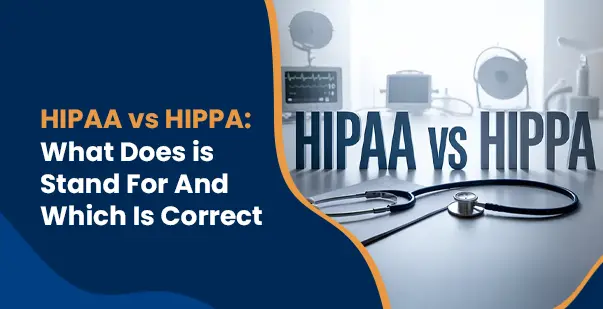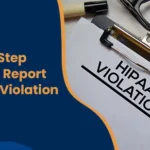HIPAA vs HIPAA: What Does it Stand For And Which Is Correct?

July 29, 2025
Introduction
When you visit your doctor for a routine check-up, you are usually confident that your sensitive health information is secure. However, what if you learned that a data breach had occurred, exposing your private medical details to the world? It’s a frightening reality, especially considering that 249.09 million patient records were exposed in healthcare data breaches between 2005 and 2019. This situation emphasizes the significance of comprehending the laws devised to defend your information.
Amid discussions about health data privacy, confusion often arises about whether HIPAA and HIPPA refer to the same thing. But what does it really stand for, and why does it matter? In this blog, we’ll clarify whether it’s HIPAA or HIPPA, explain what the acronym stands for, and examine its role in safeguarding your health information
Understanding the Acronyms: HIPPA vs. HIPAA
When organizations store patient information and want to stay updated with the legal requirements, they should learn to identify common errors people make while searching about HIPAA. Since pronunciation reflects spelling, many people confuse HIPAA with HIPPA. The key differences between the two are discussed as follows:
HIPAA
HIPAA stands for the Health Insurance Portability and Accountability Act, a key component of the decree legislated in 1996 in the United States. Its primary objectives are twofold:
- Portability:
- To ensure that individuals can maintain their health insurance coverage when they change jobs or move between states. Moreover, this aspect of HIPAA provides job security and stability for employees and their families by reducing the risk of losing health insurance due to employment changes.
- Accountability:
- To safeguard patient information by establishing national standards for the protection of health information. HIPAA sets stringent guidelines on how healthcare providers, health plans, and other entities manage and protect sensitive patient data.
HIPAA
HIPPA is simply a common misspelling—there is no law or regulation by this name. The correct acronym is HIPAA. The confusion often comes from the similar way the two acronyms sound when spoken. However, the correct term for the health data privacy law is HIPAA, which stands for the Health Insurance Portability and Accountability Act. Using the correct acronym is significant when discussing health information privacy standards.
The Origins and Evolution of HIPAA
A common question in healthcare compliance is, “Is it HIPPA or HIPAA?” This question highlights the need for clarity. Before HIPAA was enacted, the American healthcare system was inconsistent in how patient information was managed, leaving many patients’ rights and privacy unprotected.
With growing concerns about the safety of personal health information and the ability to keep health insurance when changing jobs, the need for a law became clear. Let’s look at the key events in HIPAA’s legislative process that changed how patient information is handled and protected in the United States.
-
Historical Context
Before HIPAA, the American healthcare system lacked uniformity in handling patient information. The fragmented nature of healthcare coverage often left individuals vulnerable to losing their health insurance during job transitions. The lack of a standardized framework for protecting sensitive health information also raised significant concerns.
-
Legislative Process
The HIPAA legislation was signed into law by President Bill Clinton on August 21, 1996. It was initially designed to address issues related to the portability of health insurance, ensuring that individuals could maintain coverage when changing jobs. However, the focus soon expanded to include privacy and security regulations, largely due to increasing public concern over the handling of personal health information.
The U.S. Department of Health and Human Services (HHS) was tasked with implementing regulations to enforce HIPAA’s provisions, which led to the development of several rules, notably the Privacy Rule and the Security Rule.
Read More: Best HIPAA Compliance Software in 2024
Key Components of HIPAA
The key parts of HIPAA were introduced to protect patient data and establish clear policies for healthcare providers. Dividing HIPAA into its primary parts will enable us to understand how it guards personal health data and enhances responsibility in the healthcare system. Let’s discover the vital components of HIPAA that play a major role in protecting patient privacy.
-
Privacy Regulation
The Privacy Rule specifies national measures aimed at guarding individuals’ medical documents and personal health data. It sets clear limits on the use and exposure of health details without an individual’s permission.
One component is the patient’s freedom to access their medical records and ask for revisions when required. Additionally, healthcare providers are allowed to use and reveal health data for important purposes such as treatment, payment, and healthcare procedures without requiring direct consent from the patient.
Another facet is the Minimum Necessary Standard. This Standard ensures that covered entities share only the minimum amount of health information required for a given purpose.
-
Security Rule
The Security Rule outlines specific standards to safeguard electronic protected health information (ePHI). These standards are divided into three main categories: administrative safeguards, which include policies and procedures designed to protect ePHI and regulate who can access it; physical protection, which focuses on shielding physical structures and equipment that house ePHI; and technical protection, which involves using technology and all the associated policies to protect ePHI and control who can access this sensitive information.
-
Transaction and Code Sets Rule
The Transaction and Code Sets Rule standardizes the electronic exchange of healthcare-related data. It aids in streamlining the interaction between the insurers, healthcare providers and other main players involved in healthcare services. It creates a unified system for managing various processes, such as:
- Costs
- Eligibility checks
- Claims
These things will reduce administrative jobs, enhance efficiency, and lessen errors in the healthcare process. They will also ensure that insurers and providers can trade all the necessary data. This will lead to instant processing periods and also aid in effectively fixing all the differences in patient billing and care.
-
Unique Identifiers Rule
The Unique Identifiers Rule requires healthcare providers, health plans, and employers to use unique identifiers. For example, providers are given a National Provider Identifier (NPI). These identifiers ensure that all transactions and interactions are completely accurate and that the correct entities are always recognized, lessening chaos and errors.
7 Reasons Why HIPAA is Crucial
HIPAA protects patient rights and ensures the integrity of the healthcare system. HIPAA establishes guidelines that safeguard sensitive health information, which is increasingly at risk nowadays. Here are the key reasons why HIPAA is important:
-
Patient Trust
HIPAA promotes patient trust by ensuring that personal health information is kept confidential and secure. When patients start to accept that all their personal data is completely shielded, they are likely to share their sensitive information with their respective providers, which is needed for adequate treatment.
-
Compliance and Accountability
Healthcare organizations must comply with HIPAA regulations, which require the implementation of safeguards to protect patient information. Additionally, compliance promotes accountability, which ensures that organizations maintain high standards for data protection and patient care.
-
Risk Reduction
Following HIPAA regulations helps healthcare organizations reduce the risks of data breaches and unauthorized access.Non-compliance can result in severe financial penalties and damage the organization’s reputation. Adhering to HIPAA policies helps safeguard both patients and institutions from these threats.
-
Standardization of Practices
HIPAA establishes national standards for handling patient information, promoting consistency across the healthcare industry. This standardization simplifies data sharing among providers and enhances the overall quality of care.
-
Encouragement of Technological Advancement
HIPAA drives healthcare organizations to adopt advanced security measures and technologies. Compliance with HIPAA regulations encourages the development of secure systems, improving data protection and service efficiency.
-
Legal Protection for Patients
HIPAA provides legal rights to patients regarding their health information. They can do so with the Office for Civil Rights (OCR) under the U.S. Department of Health and Human Services. The legal framework helps patients and reinforces the importance of safeguarding their health data.
-
Enhanced Public Awareness
The implementation of HIPAA has raised public awareness about the importance of health information privacy. Patients are more informed about their rights and the protections in place, which encourages them to take an active role in managing their health information.
Ways to Ensure Compliance with HIPAA
Compliance with HIPAA regulations is important for protecting patient information and avoiding legal issues. Healthcare organizations must adopt effective practices to meet these standards. Below are some strategies for ensuring compliance with HIPAA:
-
Staff Training
Regular training on HIPAA regulations and privacy practices is necessary. All employees should understand their roles in safeguarding patient information. Update training annually to reflect any changes in policies or regulations.
-
Incident Response Plans
Develop and maintain an incident response plan to address potential data breaches. This plan should outline the steps for detection, notification, and mitigation of any breaches, ensuring a swift response.
-
Use of Technology
Implement advanced security technologies such as encryption and access controls to protect electronic protected health information (ePHI). Regularly update these technologies to stay compliant with HIPAA standards.
-
Regular Audits and Monitoring
Perform regular audits to evaluate compliance with HIPAA regulations. Continuous monitoring helps detect any irregularities or breaches early.
-
Documentation and Record-Keeping
Keep thorough documentation of compliance efforts, including policies, training records, and incident responses. This documentation demonstrates adherence to HIPAA.
-
Third-Party Vendor Management
Ensure that any third-party vendors handling patient information comply with HIPAA regulations. Organizations should conduct due diligence, including risk assessments and contracts, to ensure that these vendors have appropriate safeguards in place.
Read More: Why Is HIPAA Important?
Importance of Correct Terminology and Compliance!
When it comes to healthcare, precision is very important, and this extends to the language we use. The HIPPA or HIPAA distinction matters because it reflects our commitment to protecting patient privacy and confidentiality.
Nowadays as data breaches are more common, the role of HIPAA becomes even more important. It serves as a safeguard, ensuring that patients can seek medical care without worrying about their sensitive information being exposed. Everyone involved in healthcare has a role in upholding the principles of HIPAA. Let’s stay informed and dedicated to maintaining the highest standards of health information management and ensure that trust and security remain central to our healthcare system.





